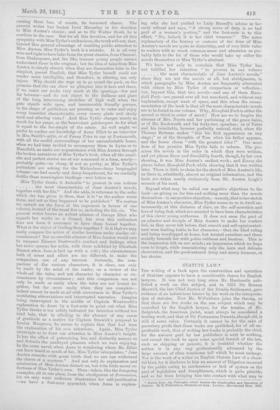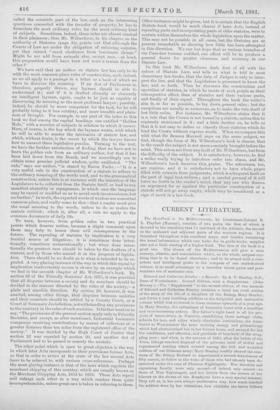STATUTE LAW.'
Tax writing of a book upon the construction and operation, of Statutes appears to have a considerable charm for English lawyers. It was not very long since Mr. Hardeastle pub fished a work on this subject, and in 1875 Sir Benson Maxwell, the late Chief Justice of the Straits Settlement, gave evidence of an industrious leisure by his work on the interpreta- tion of statutes. Now Mr. Wilberforce joins the throng, sa that there arc five works on the one subject which may be consulted by the English lawyer, for the treatise of Mr. Sedgwick, the American jurist, must always be considered a leading work, and that of Sir Fortunatus 1)warris, though old, is. still of some value. Certainly it cannot be for the sake of pecuniary profit that these books are published, for of all un- profitable work, that of writing law-books is probably the chief,. for the amount paid by law publishers is next to nothing,. and except the book be upon some special branch of the law, such as shipping or patents, it is doubtful whether the author is in any way professionally advanced by the large amount of often wearisome toil which he must undergo. Nor is the work of a writer on English Statute Law of a cheer- ful kind, for it discloses to him an amount of litigation incurred by the public owing to carelessness or lack of system on the- part of legislators and draughtsmen, which is quite pitiable, and so far from bringing him into contact with what. may be- • Stafido Law, 1110 Principles which Govern the Construction and Op:rattan t Statutes. By E. Wilberforce, Barrister-at-Law. Landon : !novena and Sons. 1881. called the scientific part of the law, such as the interesting questions connected with the transfer of property, he has to formulate the most ordinary rules for the most ordinary kind of subjects. Sometimes, indeed, these rules are almost comical in their plainness ; thus Mr. Wilberforce, in his chapter on the authority of Statutes (page 35), points out that although the Courts of Law are under the obligation of enforcing statute's, yet they cannot " exact obedience from inanimate things." Might ho not add from animals also, except men,—at least, this proposition would have been not more a truism than the +other ?
We have said that an author on statute law has only to do with the most common-place rules of construction, such, indeed, as we all apply to a passage in a letter or a book of which we 'have to discover the meaning. If an Act of Parliament is, therefore, properly drawn, any layman should be able to understand it ; and if it is drafted clumsily or obscurely an intelligent layman, again, ought to be just as capable of discovering its meaning as the most profound lawyer ; possibly, indeed, he should be more competent for the task, for he will probably bring to it less subtlety, and more breadth and plain- ness of thought. For example, in one part of the index to this took we find among the capital headings one entitled " Golden Rule," with a number of subjects in relation to which it occurs. Here, of course, is the key which the layman wants, with which he will be able to master the intricacies of statute law, and which, without doubt, is the secret by which the lawyer knows how to unravel these legislative puzzles. Turning to the text, 'we have the further satisfaction of finding that we have not to learn the golden rule from an ordinary author, but that it has been laid down from the Bench, and we accordingly are to obtain some genuine judicial wisdom, quite undiluted. "The -rule," says our author, "is stated by Baron Parke :—' It is a :very useful rule in the construction of a statute to adhere to the ordinary meaning of the words used, and to the grammatical construction, unless this is at variance with the intention of the Legislature to be collected from the Statute itself, or lead to any manifest absurdity or repugnance, in which case the language 'may be varied or modified so as to avoid such inconvenience, but no further." In truth, the expected words of wisdom are somewhat common-place, and really come to this—that a reader must give the usual meaning to the words, unless to do so makes the statute rubbish ; which is, after all, a rule we apply to the .common documents of daily life.
To turn, however, from golden rules to two practical points which deserve notice, because a slight comment upon them may help to lessen their evil consequences in the 'future. The repealing of statutes by implication is a very fruitful source of litigation ; it is sometimes done inten- tionally, sometimes unintentionally ; but when done inten- tionally the greatest care should be taken by the drafters of a statute, and by those who amend it in the progress of legisla- tion. There should be no doubt as to what is intended to be re- pealed. A very glaring instance of the way in which this repeal by implication inadvertently occurs is shown by an example which -we find in the seventh chapter of Mr. Wilberforce's book. By section 22 of the Friendly Societies' Act, 1875, it was provided that all disputes between a society and its members should be decided in the manner directed by the rules of the society,—a -plain and sensible direction. By section 30, however, it was enacted, among other things, that disputes between societies and their members should be settled by a County Court, or a `Court of Summary Jurisdiction, notwithstanding any provisions to the contrary in therules of such societies. It further went on to say, " The provisions of the present section apply only to Friendly Societies, and except, as after mentioned, Industrial Insurance companies receiving contributions by means of collectors at a greater distance than ten miles from the registered office of the society." It was decided by the High Court of Justice that section 22 was repealed by section 30, and another Act of Parliament had to be passed to remedy the mistake.
The other point which is open to great objection is the way in which later Acts incorporate in their provisions former Acts, so that in order to arrive at the state of the law several Acts :have to be referred to, with various cross-references, Perhaps the most glaring instance is that of the laws which regulate the merchant shipping of this country, which are usually known as the Merchant Shipping Acts, 1854 to 1876. These Acts repeal mid enlarge each other in a way which renders them quite incomprehensible, unless great care is taken in referring to them.
Other instances might be given, but it is certain that the English Statute-book would be much clearer if later Acts, instead of repealing parts and incorporating parts of older statutes, were to contain within themselves the whole legislation upon the matter. This may not be possible iu all cases, but the Statutes are at present remarkable as showing ,how little has been attempted in this direction. We can but hope that as various branches of our Case-law become codified, one effect will be to produce a general desire for greater clearness and accuracy in our Statute Law.
In this book Mr. Wilberforce deals first of all with the nature of Statute Law, and tells us what is told in most elementary law-books, that the duty of Judges is only to inter- pret the law, and that the Legislature is presumed to know the law, and so forth. Then he discusses the construction and operation of statutes, in which he treats of such points as their retrospective effect, thou of statutes and their various parts, and finally of their repeal. Throughout the book the writer's aim is, so far as possible, to lay down general rules ; but the exceptions are usually so numerous, as to make the rule itself of but little value. For instance, Mr. Wilberforce states that it is a rule that the Crown is not bound by a statute, unless this be expressly mentioned in it ; and a little further on, he tells us that it is not easy to define or classify those statutes which do bind the Crown without express words. When we compare this with what Sir Benson Maxwell says on the same subject, we find, though the form of Mr. Wilberforce's book is clearer, that in the result the subject is not more concisely brought before the mind. This arises not from any fault of Mr. Wilberforce, but from the difficulty of the subject. It is satisfactory, however, to find a writer really trying to introduce order into chaos, and Mr. Wilberforce's book deserves this, praise. The references, too, are copious, and it is satisfactory not to have whole pages filled with extracts from judgments, which is a frequent fault on the part of legal text-writers ; and a careful perusal of it will leave uo doubt in the reader's mind, that any one who desires an argument for or against the particular construction of a statute will not go away empty, which may be considered as a sign of merit in a law-book.



































 Previous page
Previous page